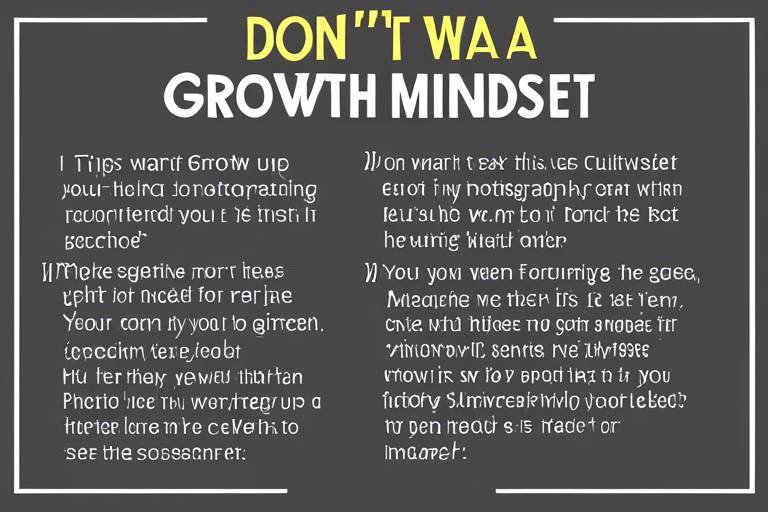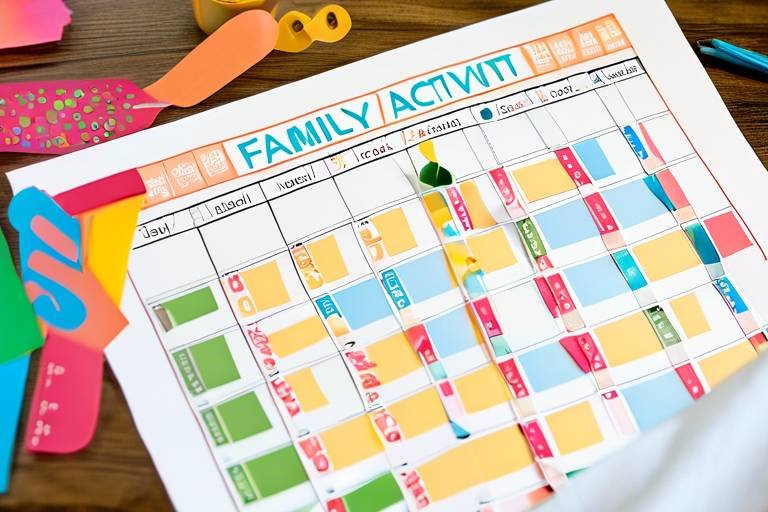10 Practical Tips for Mindful Living
Are you ready to embark on a journey towards a more mindful and fulfilling life? Incorporating mindfulness into your daily routine can lead to improved well-being and mental clarity. Let's explore 10 practical tips that can help you cultivate mindfulness in your everyday life.
Starting your day mindfully can set a positive tone for the hours ahead. Take a few moments each morning to engage in meditation or deep breathing exercises. Centering yourself before the hustle and bustle of the day begins can help you approach challenges with a calm and focused mind.
Practicing gratitude daily is a powerful way to shift your perspective and cultivate a sense of appreciation. Take time to reflect on the small joys and blessings in your life, expressing gratitude for them. This practice can enhance your overall sense of well-being and contentment.
Engaging fully in activities is another key aspect of mindful living. Instead of multitasking, focus on one task at a time. Immerse yourself fully in the present moment, paying attention to the details and sensations of the experience. This can help you appreciate the richness of each moment.
It's essential to take mindful breaks throughout your day. These short pauses allow you to step back, breathe, and re-center yourself. By incorporating moments of mindfulness into your daily routine, you can promote a sense of calm and clarity amidst the chaos of everyday life.
Cultivating mindful eating habits can transform your relationship with food. Slow down and savor each bite, paying attention to the flavors, textures, and nourishment that your meal provides. Practicing gratitude for the food on your plate can enhance your dining experience and promote mindful consumption.
Connecting with nature is a powerful way to ground yourself and reduce stress. Spend time outdoors, immersing yourself in the beauty of the natural world. This can help you foster a sense of peace and interconnectedness with the environment, promoting overall well-being.
Practice mindful listening in your interactions with others. Give your full attention when someone is speaking, without judgment or distractions. Deepening your listening skills can enhance your relationships and communication, fostering deeper connections and understanding.
End your day mindfully by reflecting on your experiences and setting intentions for the next day. Engage in a brief mindfulness practice before bedtime, expressing gratitude for the day's events and contemplating ways to approach the challenges and opportunities that lie ahead.

Start Your Day Mindfully
Explore simple yet effective strategies to incorporate mindfulness into daily life for improved well-being and mental clarity.
Starting your day mindfully can set a positive tone for the hours ahead. Imagine waking up to the gentle morning light, taking a moment to center yourself before the hustle and bustle begins. Consider incorporating a short meditation or deep breathing exercise into your morning routine. These practices can help calm your mind, focus your thoughts, and prepare you for the day's challenges.

Practice Gratitude Daily
Practicing gratitude daily is a powerful way to shift your focus towards positivity and abundance. When you take the time to acknowledge and appreciate the blessings in your life, no matter how small they may seem, you cultivate a mindset of thankfulness that can transform your outlook on life. It's like watering a plant - gratitude nourishes your soul and helps you bloom with joy. Imagine each moment of gratitude as a ray of sunshine, brightening your day and warming your heart.

Engage Fully in Activities
When it comes to living mindfully, one of the key strategies is to engage fully in activities. Picture yourself fully immersed in a task, giving it your undivided attention like a painter focused on each brushstroke creating a masterpiece. By dedicating yourself entirely to what you are doing at the moment, you not only enhance your mindfulness but also improve the quality of your work. It's like being the conductor of an orchestra, guiding each instrument to harmonize beautifully. This practice allows you to experience a deeper connection with the present moment, free from the distractions that often pull us away from truly being present.

Take Mindful Breaks
Amidst the hustle and bustle of daily life, it's crucial to incorporate mindful breaks to pause, breathe, and re-center. These breaks serve as moments of respite, allowing you to step back from the chaos and regain a sense of calm and clarity. By taking mindful breaks, you can enhance your overall well-being and productivity throughout the day.
During these breaks, focus on your breath, inhaling deeply and exhaling slowly to anchor yourself in the present moment. Consider finding a quiet space where you can retreat for a few minutes to reset your mind and body. Engaging in mindfulness practices such as body scans or simple stretching exercises can further amplify the benefits of these breaks.
It's essential to disconnect from technology and external stimuli during these mindful breaks to fully immerse yourself in the experience. By tuning out distractions, you create a space for introspection and self-awareness, enabling you to return to your tasks with renewed focus and energy.
Consider incorporating mindful breaks into your daily routine at strategic intervals, such as mid-morning and mid-afternoon, to prevent burnout and maintain a sense of balance. These moments of pause can act as anchors in your day, grounding you in the present and fostering a greater sense of mindfulness in all your activities.
Remember, taking mindful breaks is not a luxury but a necessity for your overall well-being. Embrace these moments as opportunities to recharge and realign with your inner self, allowing you to navigate life's challenges with grace and resilience.

Cultivate Mindful Eating Habits
Eating mindfully goes beyond just nourishing your body; it's about savoring each bite and being fully present during meals. When you cultivate mindful eating habits, you develop a deeper appreciation for food and its impact on your well-being. One effective way to practice mindful eating is to engage all your senses while dining. Notice the colors, textures, and aromas of your food. Take the time to chew slowly and savor the flavors that unfold in your mouth. By eating mindfully, you can enhance your relationship with food and gain a greater understanding of your body's hunger and fullness cues.

Connect with Nature
Explore simple yet effective strategies to incorporate mindfulness into daily life for improved well-being and mental clarity.
When it comes to mindfulness, connecting with nature can be a powerful way to ground yourself and find inner peace. Imagine yourself standing barefoot on soft grass, feeling the gentle breeze on your skin, and listening to the soothing sounds of rustling leaves and chirping birds. Nature has a way of calming our minds and rejuvenating our spirits, reminding us of the beauty and interconnectedness of all living things.

Practice Mindful Listening
Explore simple yet effective strategies to incorporate mindfulness into daily life for improved well-being and mental clarity.
When it comes to mindful living, listening plays a crucial role in deepening relationships and fostering better communication. Mindful listening involves more than just hearing words; it requires giving your full attention to the speaker without judgment or distractions. Imagine listening not only with your ears but with your heart and mind, truly understanding the message being conveyed.
By practicing mindful listening, you create a space for others to express themselves openly and feel heard and valued. This practice can lead to stronger connections, increased empathy, and a deeper understanding of those around you. It involves being fully present in the moment, setting aside your own thoughts and opinions to focus entirely on the speaker.
One effective way to practice mindful listening is to maintain eye contact, nod in acknowledgment, and provide verbal cues to show that you are actively engaged in the conversation. Avoid interrupting or formulating your response while the other person is speaking; instead, listen attentively and respond thoughtfully once they have finished.
Furthermore, practicing mindful listening not only benefits your relationships with others but also enhances your own mindfulness and presence. It allows you to appreciate the richness of each interaction, gaining valuable insights and deepening your connection with the world around you.
Q: How can I improve my listening skills for mindful living?
A: To enhance your mindful listening skills, practice active listening by focusing on the speaker, maintaining eye contact, and avoiding distractions. Additionally, cultivate empathy and an open mind to truly understand the message being communicated.
Q: What are the benefits of practicing mindful listening?
A: Mindful listening can lead to improved relationships, enhanced communication, increased empathy, and a deeper sense of connection with others. It promotes understanding, respect, and meaningful interactions in both personal and professional settings.

End Your Day Mindfully
As the day winds down, it's essential to conclude it with mindfulness to promote relaxation and prepare for a restful night's sleep. One effective way to end your day mindfully is to engage in a calming bedtime routine that signals to your body and mind that it's time to unwind. This could involve activities such as gentle stretching, reading a book, or journaling about your day's experiences.
Creating a serene environment in your bedroom can also aid in ending your day mindfully. Dimming the lights, playing soothing music, or using essential oils can help create a peaceful atmosphere conducive to relaxation. By setting the stage for tranquility, you can ease into a state of calmness and prepare your mind for a good night's rest.
Reflecting on the events of the day is another important aspect of ending your day mindfully. Take a few moments to review the day's highlights and challenges without judgment. Acknowledge your achievements and areas for growth with a sense of acceptance and self-compassion. This practice of self-reflection can help you gain insights, learn from experiences, and cultivate gratitude for the day's lessons.
Before you drift off to sleep, consider incorporating a brief mindfulness practice to center yourself and release any lingering tension or worries. This could be a simple breathing exercise, body scan, or visualization technique to relax both your body and mind. By ending your day with mindfulness, you can promote a sense of closure, peace, and readiness for a new day ahead.
Frequently Asked Questions
- What is mindfulness?
Mindfulness is the practice of being fully present and engaged in the current moment, without judgment or distraction. It involves paying attention to your thoughts, feelings, bodily sensations, or the surrounding environment with acceptance and openness.
- How can mindfulness benefit my daily life?
Mindfulness can bring a wide range of benefits, including reduced stress, improved focus and concentration, enhanced emotional regulation, better relationships, and overall increased well-being. By incorporating mindfulness into your daily routine, you can experience greater mental clarity and a deeper sense of peace.
- Is mindfulness only about meditation?
While meditation is a common practice to cultivate mindfulness, it is not the only way to be mindful. Mindfulness can be integrated into various aspects of daily life, such as eating, walking, listening, and interacting with others. It's about bringing awareness and intention to all activities, not just sitting in meditation.
- How can I start practicing mindfulness if I'm a beginner?
Begin by incorporating small mindful moments into your day, such as taking a few deep breaths, noticing your surroundings, or focusing on the sensations in your body. You can also try guided meditations, mindful eating exercises, or simply pausing to appreciate the present moment throughout the day.
- Can mindfulness help with anxiety and depression?
Yes, mindfulness has been shown to be effective in reducing symptoms of anxiety and depression. By cultivating awareness of your thoughts and emotions without getting caught up in them, you can develop a more compassionate and non-reactive relationship with your inner experiences, which can help alleviate mental health challenges.



















